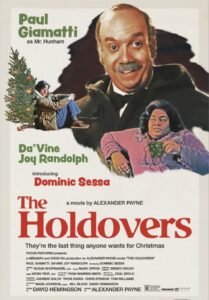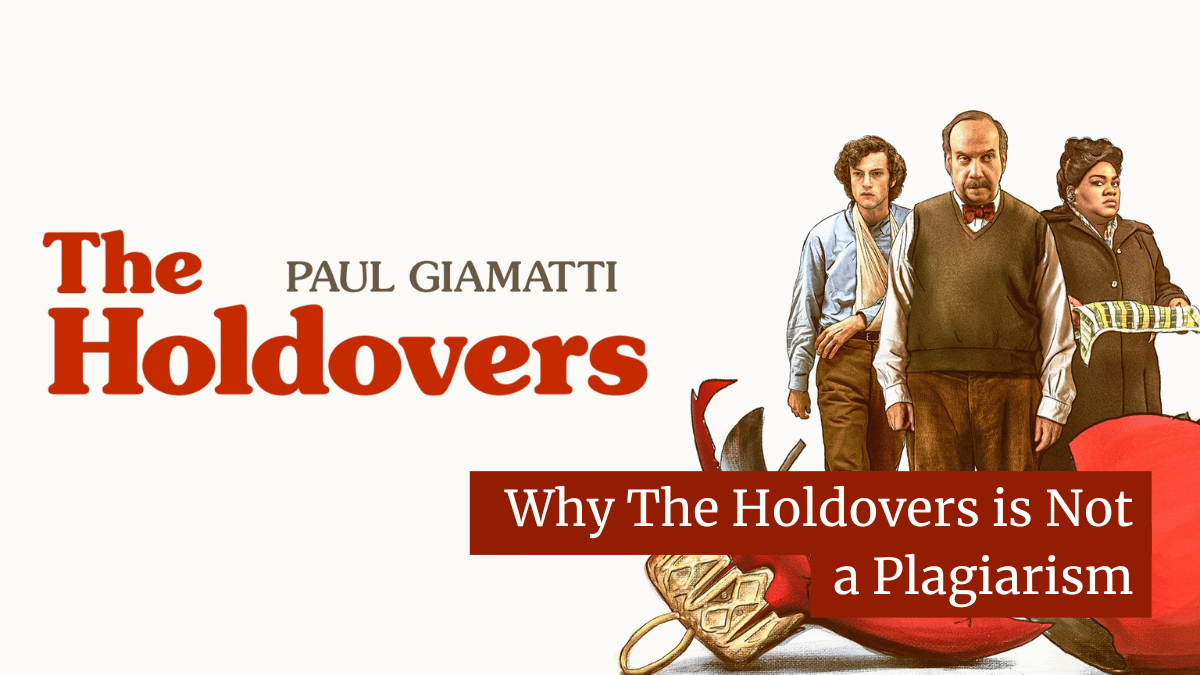Why The Holdovers is Not a Plagiarism

At the Academy Awards this past weekend, Alexander Payne-directed film The Holdovers was nominated in five categories, including Best Original Screenplay. While it didn’t win that category, Da’Vine Joy Randolph did take home the Oscar for Best Actress in a Supporting Role and the film remains highly regarded by critics and audiences alike.
However, going into the event, its success was at risk of being overshadowed by a report by Tatiana Siegel at Variety that highlighted plagiarism allegations against David Hemingson, the author of the film’s screenplay.
According to the report and published documents, the allegations were made by Simon Stephenson, a screenwriter who worked on films such as Luca and Paddington 2. He claims, in a 33-page document, that The Holdovers was transposed from his unproduced script, Frisco, and that the similarities are “line-by-line” have been routinely described as “brazen.”
Stephenson made the allegations in a series of emails sent to the Writers Guild of America (WGA), the union that represents screenwriters. In those emails, the WGA made it clear that, while they were sympathetic, that they do not arbiter plagiarism disputes and that a lawsuit is Stephenson’s best path forward if he feels so strongly about the similarities and wanted credit for the film.
Though Variety did not say where they received the emails, they have been making rounds in Hollywood circles. Stephenson did not comment on the allegations but did confirm the authenticity of the emails. Neither Payne nor Hemingson commented either.
But this raises a simple question: How serious are these allegations? And what is the likely outcome should a lawsuit be filed?
To answer that, we must start with the allegations themselves.
The Allegations
Right off the bat, the allegations do have a great deal more credibility than most similar accusations.
First, Stephenson is a well-respected screenwriter with several major credits to his name. Furthermore, Stephenson did not simply run out and file a lawsuit, he took the matter up with the WGA, hoping that the union could help sort the issue out without litigation.
Also, Stephenson’s screenplay is not unknown. Though it has not been produced, it has been read and reviewed by many in the industry. In 2013, it was number three on the Black List, an annual list of the industry’s best unproduced screenplays. In 2019 the screenplay was pitched to Netflix and company executive Lisa Nishimura handed the script to Payne around this time. Shortly after that Payne and Hemingson began working on the film that would become The Holdovers.
With all that in mind, it is easy to see why the industry is taking these allegations more seriously. You have an industry insider going through industry channels to point out how similar an Oscar-nominated film is to another well-known and well-respected screenplay that he wrote.
Compare this to the number of times we have seen relatively unknown writers sue screenwriters, producers and others involved over allegations of copyright infringement, usually with convoluted stories about how their work was accessed and plagiarized, and it is easy to see why the claims are getting attention.
And of those claims, there are many. In a 33-page document published by Variety, Stephenson makes dozens of claims of similarities between the films, essentially saying that The Holdovers is a scene-by-scene, if not line-by-line, transposition of his work. He claims that this was likely done by taking his script and rewriting it scene-for-scene using “new” characters and other details.
And to be clear, the films do have some similarity. Both feature a misanthropic older character who is forced to care for a troubled teenager and feature similar secondary characters and an overall similar plot, including many specific scenes, although in a different order.
According to the Variety report, there are some in Hollywood who are disturbed by the similarities, including at least some in the WGA.
However, not all are convinced and that includes many in Hollwood, in particular other screenwriters.
The Problems with the Case
While the similarities between the films are obvious, when you look at the specifics of the complaint, the wheels begin to come off.
For much of the document, Stephenson highlights various scenes that he says the two films share that are nearly identical. However, even a cursory examination of those scenes who that not only are they not identical, but they are also not very similar, with very different dialog and other elements.
Instead, what the scenes have in common deals more with the structure of the movie. For example, a boss calling an employee into their office or two characters getting stuck together in a quiet place (library vs. quiet carriage).
However, screenwriters are skeptical about those claims. According to a report by Mike Roe at The Wrap, screenwriters have taken to X (formerly Twitter) to express frustration at both the allegations and Variety’s reporting.
In short, the writers have noted that the similarities between the two films deal more with generic plot elements and structures rather than with specific details.
Hanna Shaw-Williams, in an article for SlashFilm, agrees, saying that the allegations are “ridiculous” and notes that the trope of the older character forced to spend time with the younger one is not unique to either The Holdovers or Frisco, going back at least 90 years in cinema.
In fact, Payne has specifically cited the French film Merlusse as the inspiration for The Holdover. In many ways, those two films are closer than The Holdover is with Frisco, specifically because they share a setting, namely a boarding school.
That, in turn, creates a real issue for Stephenson. Even if The Holdovers is a plagiarism of his work, it is difficult to say what was stolen from it directly. In particular, what could not have been just as easily “stolen” from somewhere else.
My Analysis
Note: I have not seen The Holdovers nor have I read Frisco. This analysis is based solely on the allegations provided by Stephenson and the follow ups shared by other screenwriters.
When you examine the claims in detail, they do not really hold up that well. For example, sharing a bottle of whisky is different from sharing a taxi. A symbolic billboard is only the same as a symbolic cognac bottle in the sense that they are both symbols.
As others have pointed out, you can take the formula that Stephenson has used to show similarity to accuse almost any two films of being based on one another.
When you strip away the things that are not similar, despite Stephenson’s insistence that they are, you are left with mostly tropes and elements that well predate Stephenson’s work. You strip those away and pretty much nothing is left.
Yes, the two films have clear similarities, but those similarities are not unique to either of the films and are tropes and standards upon which countless films have been built.
To be clear, I have no doubt that Stephenson is being honest about his beliefs that this is a work of plagiarism. However, I worry that it comes more from a place of frustration than it does from a place of actual plagiarism.
Stephenson has a right to be frustrated. His script has been passed around for over a decade and, despite a great deal of interest, never made it into production. Now, a somewhat similar film received 5 Oscar nominations and seems to be heading toward being a major commercial success. I would be frustrated too.
As we discussed in 2018, it’s easy to create a fake plagiarism story. All you need to do is find two similar-ish works and highlight/exaggerate their similarities while ignoring the differences. However, that does not mean that the allegations were made in bad faith, just that they saw patterns where either there were none or those patterns were not signs of plagiarism.
That is what I believe happened here, Stephenson is understandably angry and is both ignoring differences between the works not acknowledging that many of the actual similarities are just tropes and standards.
That is very understandable, if heartbreaking.
Bottom Line
These allegations are getting more traction because of who is making them and how they are being made, not the contents of the allegations themselves. If these had been made in a random lawsuit by an unknown writer, they would be immediately dismissed as one of the “dime a dozen” plagiarism allegations common to Hollywood.
Speaking of which, the prospects for a lawsuit in this case are dim. Given that there are so many earlier works with similar themes, it is going to be incredibly difficult to show not only that something protectable by copyright was taken, but that it could have only been taken from Frisco. Though access to the original work is easily proved, that is only the first test to make a claim stick.
Given the difficulties Stephenson is facing getting his fellow screenwriters to take the allegations seriously, it is going to be significantly more difficult to prove them in a court of law, which has both higher standards for proof and what is actionable.
In the end, I have a great deal of sympathy for Stephenson. Not because he is the victim of plagiarism (at least not in this case), but because he believes he was. When you have invested so much time and energy into something, it is quite easy to see patterns in similar works that are more successful, even if those patterns do not exist or do not prove plagiarism.
I worry that Stephenson may have harmed his career with these allegations and made it even less likely that Frisco will see the light of day. To make matters worse, it does not appear that he took the battle public. He had been emailing his union, hoping to work the issue out there. While it is unclear how Variety obtained the emails, it does not seem it was through him.
I feel sympathy for everyone involved. Stephenson the way this case has unfolded, Hemingson and Payne for having their moment tainted at least some, and for all who are stuck trying to arbiter between the two sides.
It is an unfortunate story with no real winners. But it is one that the WGA could learn from and provide a path to mediate such cases in the future. At the very least, it might prevent such a case from going public needlessly again.
Want to Reuse or Republish this Content?
If you want to feature this article in your site, classroom or elsewhere, just let us know! We usually grant permission within 24 hours.
